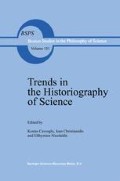Abstract
In this paper I will attempt to consider the connection between epistemology and the sociology of knowledge by sketching the historical development and I want to show how both come to bear upon, in different ways, similar issues in mathematical and scientific knowledge. Mathematics in fact becomes a touchstone for these attempts as a constructivist epistemology that is pointedly expressed in mathematical cognition, substitutes traditional empiricism, nominalism and behaviorism thereby providing a basis for understanding that connection.
Access this chapter
Tax calculation will be finalised at checkout
Purchases are for personal use only
Preview
Unable to display preview. Download preview PDF.
References
Amsterdamski, A., 1975, Between Experience and Metaphysics, Kluwer, Dordrecht.
Bateson, G., 1972, Steps to an Ecology of Mind,New York.
Bateson, G., 1979, Mind and Nature,New York.
Bernal, J. D., 1963, The social function of science,Cambridge/USA.
Bloor, D., 1976, Knowledge and Social Imagery,London.
Bloor, D., 1983, Wittgenstein - A Social Theory of Knowledge,London.
Brannigan, A., 1981, The Social Basis of Scientific Discoveries,Cambridge.
Cassirer, E., 1910, Substance and Function, Engl. edition, Dover N.Y. 1953.
Cassirer, E., 1974, Das Erkenntnisproblem in der Philosophie und Wissenschaft der neueren Zeit, vol. II, reprint, Darmstadt.
Collins, H. M., 1990, Artificial Experts,Cambridge/USA.
Csikszentmihalyi, M., 1990, Flow,New York.
Durkheim, E., 1912, The Elementary Forms of the Religious Life, English translation. Glencoe/III., 1915, reprint 1926.
Feher, M., 1981, “Some Remarks on Meaning Invariance and Incommensurability”, Science of Science No. 3–4 (7–8) vol. 2, pp. 431/432.
Hofstadter, H., 1979, Gödel, Escher, Bach, Hassocks, U.K.
Luhmann, N., 1990a, Die Wissenschaft der Gesellschaft,Frankfurt/M.
Luhmann, N., 1990b, “The Cognitive Program of Constructivism and a Reality that Remains Unknown”, Selforganization, W. Krohn, G. Küppers and H. Nowotny (eds.), Kluwer, Dordrecht, pp. 64–85.
Lukes, S., 1973, Emile Durkheim,Penguin Books.
Mannheim, K., 1929, Ideology und Utopie, Frankfurt/M., reprint 1965.
Mehlberg, J. J., 1962, “A Classification of Mathematics Concepts”, Synthese 14, pp. 78–86.
Mill, J. S., 1865, “Auguste Comte and Positivism”, Essays on Ethics, Religion and Society, Coll. Works, vol. X, Toronto, reprint 1969.
Mormann, Th., 1991, “Neuraths Enzyklopädismus: Entwurf eines radikalen Empirismus”, Journal for General Philosophy of Science 22, pp. 73–100.
Otte, M., 1986, “What is a Text?”, Perspectives on Mathematics Education, B. Christiansen, A. G. Howson and M. Otte (eds.), Kluwer, Dordrecht, pp. 173–203.
Otte, M., 1990, “Intuition and Logic”, For the Learning of Mathematics, vol. 10, pp. 37–43.
Otte, M., 1991, “Style as a Historical Category”, Science in Context 4 (2), pp. 233–264.
Otte, M., 1993, “Towards a Social Theory of Formal Knowledge”, Learning from Computers
Otte, M., Mathematics Education and Technology,W. Dörfler, K. Keitel, and K. Ruthven (eds.), Springer, Heidelberg.
Pattee, H. H., 1979, “Discrete and Continuous Processes in Computers and Brains”, Lecture Notes in Biomathematics, Heidelberg, pp. 128–148.
Peirce, Ch. S., 1965, Collected Papers,6 vols, Cambridge/Mass.
Slezak, P., 1989, “Scientific Discovery by Computer as Empirical Refutation of the Strong Programme”, Social Studies of Science 19, pp. 563–600.
Author information
Authors and Affiliations
Editor information
Editors and Affiliations
Rights and permissions
Copyright information
© 1994 Springer Science+Business Media Dordrecht
About this chapter
Cite this chapter
Otte, M. (1994). Historiographical Trends in the Social History of Mathematics and Science. In: Gavroglu, K., Christianidis, J., Nicolaidis, E. (eds) Trends in the Historiography of Science. Boston Studies in the Philosophy of Science, vol 151. Springer, Dordrecht. https://doi.org/10.1007/978-94-017-3596-4_22
Download citation
DOI: https://doi.org/10.1007/978-94-017-3596-4_22
Publisher Name: Springer, Dordrecht
Print ISBN: 978-90-481-4264-4
Online ISBN: 978-94-017-3596-4
eBook Packages: Springer Book Archive

